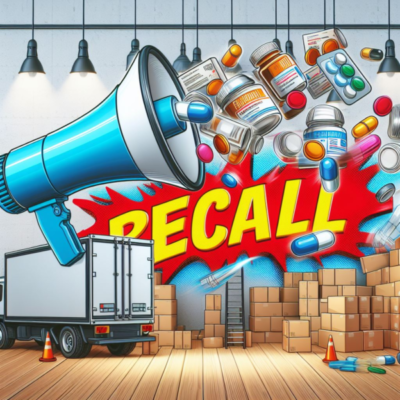

Discussion forum for Pharma Quality events, Regulatory Actions
Warning letters, 483s, Recalls, Import Alerts, Audit observations

Warning letters, 483s, Recalls, Import Alerts, Audit observations

Accord (Intas) initiated a recall of several lots of Levothyroxine tablets in the US for Subpotent Drug – Assay below the specification issue.
Levothyroxine indicated for treatment of Hypothyroidism is known to be vulnerable to degradation and loss of potency and there are have been several recalls reported for Levothyroxine from various manufacturers. In fact Levothyroxine Oral Solid dosage form tablets are one of the most frequently recalled drugs registering more than 70 recalls in US from year 2000 till date as per USFDA Enforcement Database.
Stability Issues of Levothyroxine
Though Levothyroxine and its hydrated forms as API are stable under ambient temperature and humidity, formulation process, microenvironment of the formulations, humidity etc introduces stability challenges in Levothyroxine tablet formulations.
Levothyroxine is a narrow therapeutic index drug and Levothyroxine is administered at low doses 0.025 – 3.75mcg in tablets and this also raises issues of content uniformity.
Levothyroxine formulations have extremely small quantities of active pharmaceutical ingredient in the order of micrograms, so interactions between API and excipients, can cause significant loss of potency. Amount of levothyroxine in solid formulations (tablets) is considerably lower in comparison to the amount of excipients and the interactions that could occur can cause significant degradation and loss of potency. Levothyroxine has a complex stability profile and is sensitive to various environmental factors such as light, air oxygen, and humidity. Use of different excipients, the pH of the formulation, compression force used during tablet compaction are also some of the factors which can cause degradation of levothyroxine
Deiodination is the primary degradation pathway of Levothyroxine (T4 – as it has 4 iodine atoms in the structure) involving loss of one or more of the iodine atoms forming 3,3′,5-triiodothyronine (T3), 3,5-diiodothyronine (T2), and other deiodinated forms.
Deamination under elevated temperatures, is another predominant degradation pathway involving the removal of the amino group from the levothyroxine molecule with formation of Thyroacetic acid derivatives 3,3′,5,5′-tetraiodothyroacetic acid (TTAA4), TTAA3, TTAA2).
Manufacture of Levothyroxine oral solid dosage formulations has to have a delicate balance of moisture / water content in formulation and relative humidity. Higher proportion of water could cause hydrolysis and deiodination as also interaction with excipients like lactose, mannitol and even excipients like crospovidone, povidone. Povidone, Crospovidone are hygroscopic and have affinity for water of crystallisation of Levothyroxine hydrate. With reducing sugars like lactose, a common excipient in formulations, the aldehydic group can react with the primary amine group of Levothyroxine via Maillard reaction to form inactive adducts. This reaction is accelerated by heat and humidity.
Dehydration of Levothyroxine pentahydrate under low humidity, higher temperature conditions and degradation of levothyroxine in presence of oxygen at low relative humidity can also lead to loss of potency. Photodegradation through deiodination is another degradation pathway with Levothyroxine being highly sensitive to light.
Manufacturing process steps of drying, milling, compression can cause short duration low-humidity conditions, and it is important to optimise the process conditions for low duration exposure to keep any degradations within acceptable levels.
Recall Trends from USFDA Enforcement Reports
Though approved in October 2020, there were no recalls of Levothyroxine tablets by Accord listed in USFDA Enforcement Reports till June 2025. In June 2025 Accord initiated recall of several lots of Levothyroxine Sodium Tablets in various strengths – 25mcg, 50mcg, 100mcg, 112mcg, 150mcg, 175mcg.
Viatris / Mylan recalled several lots of Levothyroxine in year 2024 for sub potent / super potent drug. Mylan’s Levothyroxine generic was approved in 2002. Alvogen (approved in 2002) also recalled a lot of Levothyroxine tablet in 2024. Also there were various recall of Levothyroxine reported from year 2002 onwards.
As discussed above excipients like Lactose, Mannitol, Povidone, Crospovidone, Sodium Lauryl Sulphate play a role in degradation and loss of potency of Levothyroxine. Viatris / Mylan formulation include Mannitol, Povidone, Crosposidone and SLS while Alvogen has Povidone in the formulation. Accord’s formulation do not involve any of the at-risk excipients.
There are other approved generics for Levothyroxine tablets in different strengths including from Lupin (approved in 2019), Ascent (2023), Macleod (2022) which has not reported recalls as per the USFDA Enforcement Report database so far. Lupin formulation has Mannitol while Ascent formulation has Povidone. Macleoid formulation do not use any of the at risk excipients discussed above.
Overall it indicates that while it will be prudent to avoid at risk reagents in the formulation, this alone does not guarantee the risk of degradation in Levothyroxine formulations. Levothyroxine degradation is not due to a single excipient or a single pathway. It’s a complex interplay of light, temperature, moisture, oxygen, and the specific chemical environment created by the combination of all excipients. Processing conditions and control, controlled manufacturing environment also will play a key role in Levothyroxine stability. It’s the holistic control of the manufacturing environment, the processing parameters, and the final packaging along with appropriate excipients in the process that will determines the long-term stability and potency of levothyroxine tablets
References:
Leave a Comment
You must be logged in to post a comment.